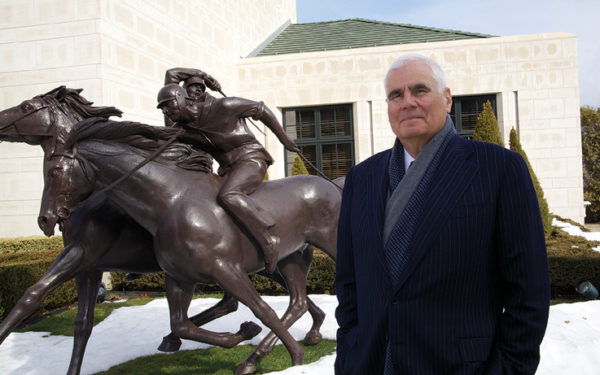
- Robert Scinto in front of Il Palio restaurant at 5 Corporate Drive in Shelton, where he is the landlord. File photo by Bob Rozycki.
Robert D. Scinto, one of the state”™s leading real estate developers and a force in eastern Fairfield County, recently blasted the state”™s tax code, saying it has chased business to other states and has helped stall development in the corporate real estate market.
“We need to get a bit of growth policy in Connecticut before you see these [rent] numbers come down drastically,” he said. “Right now the tax policies in the state are driving people out of the state.”
Scinto, who founded his Shelton-based development company, R.D. Scinto Inc., in 1975, said the commercial real estate market is significantly different than it was after the mid-1980s and early 1990s, when changes to the tax code affected commercial real estate.
“A lot of buildings were not being built for economic reasons, but for tax reasons,” he said of the situation 25 years ago. Now, however, “The demand is good, but there is not any more supply being added. You are not seeing anyone build any spec office buildings today.”
Of the 3.4 million square feet across 34 buildings Scinto owns and manages in Fairfield County, less than 1 percent of the space is vacant, he said.
Class A corporate buildings are in high demand and if there are vacancies anywhere, it is the class B buildings, which are unsuitable and unable to meet the needs of Class A tenants, he said.
“That is why the rents are still doing well,” Scinto said. “You are not going to see any new buildings built in Connecticut for a long time.”
So where are the class B tenants? Look south, way south, said Scinto.
“People who tend to have a large amount of capital and start new businesses locate their companies where the tax situation is better, that”™s why they are going  to Florida, no personal income tax or death tax ”“ Connecticut  has both,” he said.
He lamented the current economic climate in the state, as he ticked off regional amenities including an idyllic shoreline, access and proximity to New York City and, a point of emphasis for Scinto, its abundance of college-educated labor, among the highest in the country, he said.
“The bottom line is to grow a company you have to be in an area where you have creative people and Connecticut has creative people,” he said. “If you discourage people from staying in your state, the people with money, all you are left with is poor people and that can”™t be.”
Scinto points to towns like Shelton and Ansonia that have rolled out the red carpet for new development projects as opposed to other municipalities he declined to name, which can be more obstructive than productive.
“Their attitude is, How can we help you get it started?” he said of the business-friendly municipalities. “Some other towns, that is not the case.”
Turning his focus to Hartford, he said, “We need to just work on the state policies. You can”™t spend more than you earn. You can”™t have tax increases every other year. And you have got to stop with the death taxes.


















